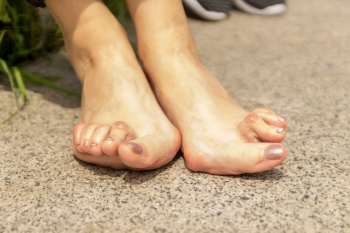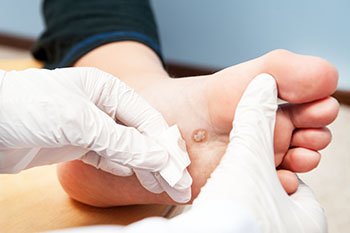
Rheumatoid arthritis, or RA, is an autoimmune condition that often impacts the feet and ankles, leading to joint inflammation and structural changes over time. This chronic inflammation can make walking difficult and painful, especially during flare-ups. Movements that require side to side motion or walking on uneven surfaces may become challenging due to stiffness and instability. As the condition progresses, the arch of the foot can collapse, causing the foot to flatten and altering the way weight is distributed. This change can lead to further discomfort and imbalance. Bunions, which are bony bumps that form on the joint at the base of the big toe, are also common in individuals with rheumatoid arthritis. If you have symptoms of RA in your feet and ankles, it is strongly suggested that you are under the care of a podiatrist who can help you to manage this uncomfortable condition.
Because RA affects more than just your joints, including the joints in your feet and ankles, it is important to seek early diagnosis from your podiatrist if you feel like the pain in your feet might be caused by RA. For more information, contact Dr. Thomas Madden of Advanced Foot Care Center. Our doctor will assist you with all of your podiatric concerns.
What Is Rheumatoid Arthritis?
Rheumatoid Arthritis (RA) is an autoimmune disorder in which the body’s own immune system attacks the membranes surrounding the joints. Inflammation of the lining and eventually the destruction of the joint’s cartilage and bone occur, causing severe pain and immobility.
Rheumatoid Arthritis of the Feet
Although RA usually attacks multiple bones and joints throughout the entire body, almost 90 percent of cases result in pain in the foot or ankle area.
Symptoms
- Swelling and pain in the feet
- Stiffness in the feet
- Pain on the ball or sole of feet
- Joint shift and deformation
Diagnosis
Quick diagnosis of RA in the feet is important so that the podiatrist can treat the area effectively. Your doctor will ask you about your medical history, occupation, and lifestyle to determine the origin of the condition. Rheumatoid Factor tests help to determine if someone is affected by the disease.
If you have any questions please feel free to contact our office located in Killeen, TX . We offer the newest diagnostic and treatment technologies for all your foot and ankle needs.

Pain on the inside of the ankle, also called medial ankle pain, is often linked to problems with the deltoid ligament, a strong band of tissue that supports the inner part of the joint. This ligament can be injured by rolling the ankle inward or from repeated strain over time. However, not all medial ankle pain comes from the deltoid ligament. Other causes include inflammation of nearby tendons, arthritis, or stress fractures. Symptoms may include swelling, stiffness, or difficulty bearing weight. A careful exam and imaging tests help identify the exact cause. Early treatment with rest, bracing, and targeted exercises can prevent further damage. Ignoring pain may lead to long-term issues with balance and mobility. If you feel pain or weakness on the inside of your ankle, it is suggested that you see a podiatrist for a diagnosis and appropriate treatment.
Ankle pain can be caused by a number of problems and may be potentially serious. If you have ankle pain, consult with Dr. Thomas Madden from Advanced Foot Care Center. Our doctor will assess your condition and provide you with quality foot and ankle treatment.
Ankle pain is any condition that causes pain in the ankle. Due to the fact that the ankle consists of tendons, muscles, bones, and ligaments, ankle pain can come from a number of different conditions.
Causes
The most common causes of ankle pain include:
- Types of arthritis (rheumatoid, osteoarthritis, and gout)
- Ankle sprains
- Broken ankles
- Achilles tendonitis
- Achilles tendon rupture
- Stress fractures
- Bursitis
- Tarsal tunnel syndrome
- Plantar fasciitis
Symptoms
Symptoms of ankle injury vary based upon the condition. Pain may include general pain and discomfort, swelling, aching, redness, bruising, burning or stabbing sensations, and/or loss of sensation.
Diagnosis
Due to the wide variety of potential causes of ankle pain, podiatrists will utilize a number of different methods to properly diagnose ankle pain. This can include asking for personal and family medical histories and of any recent injuries. Further diagnosis may include sensation tests, a physical examination, and potentially x-rays or other imaging tests.
Treatment
Just as the range of causes varies widely, so do treatments. Some more common treatments are rest, ice packs, keeping pressure off the foot, orthotics and braces, medication for inflammation and pain, and surgery.
If you have any questions, please feel free to contact our office located in Killeen, TX . We offer the newest diagnostic and treatment technologies for all your foot care needs.

Nongenital cutaneous warts, often found on the feet and toes, are caused by strains of the human papillomavirus, or HPV. These warts may appear as rough, thickened areas and sometimes grow inward due to pressure from walking. Treatment depends on the location, size, and persistence of the wart. Topical salicylic acid can help in mild cases by gradually peeling away layers of the wart. Cryotherapy, which uses liquid nitrogen to freeze the wart, is a common in-office procedure. Other methods include laser therapy, chemical treatments, or immune-based therapies to stimulate the body’s natural defense. In some cases, a minor surgical procedure may be required to remove deeply rooted or stubborn warts. Avoiding barefoot walking in public areas can help prevent future infections. If you have a persistent wart on your foot that is painful or not responding to treatment, it is suggested you see a podiatrist for a diagnosis and appropriate treatment.
Plantar warts can be very uncomfortable. If you need your feet checked, contact Dr. Thomas Madden from Advanced Foot Care Center. Our doctor will assist you with all of your foot and ankle needs.
About Plantar Warts
Plantar warts are the result of HPV, or human papillomavirus, getting into open wounds on the feet. They are mostly found on the heels or balls of the feet.
While plantar warts are generally harmless, those experiencing excessive pain or those suffering from diabetes or a compromised immune system require immediate medical care. Plantar warts are easily diagnosed, usually through scraping off a bit of rough skin or by getting a biopsy.
Symptoms
- Lesions on the bottom of your feet, usually rough and grainy
- Hard or thick callused spots
- Wart seeds, which are small clotted blood vessels that look like little black spots
- Pain, discomfort, or tenderness of your feet when walking or standing
Treatment
- Freezing
- Electric tool removal
- Laser Treatment
- Topical Creams (prescription only)
- Over-the-counter medications
To help prevent developing plantar warts, avoid walking barefoot over abrasive surfaces that can cause cuts or wounds for HPV to get into. Avoiding direct contact with other warts, as well as not picking or rubbing existing warts, can help prevent the further spread of plantar warts. However, if you think you have developed plantar warts, speak to your podiatrist. He or she can diagnose the warts on your feet and recommend the appropriate treatment options.
If you have any questions please feel free to contact our office located in Killeen, TX . We offer the newest diagnostic and treatment technologies for all your foot and ankle needs.





